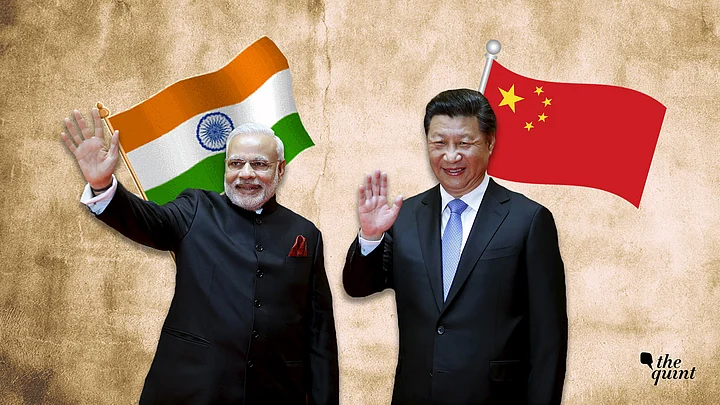Expectations were not too high from the Chennai summit between Chinese Premier Xi Jinping and Indian Prime Minister Narendra Modi, that concluded on Saturday, 12 October. The fact that in terms of words and gestures, at least, it appears to have gone swimmingly well, is a tribute to the fine art of diplomacy.
The reality is that both sides will continue to do what they do and have done, and not quite live up to the spirit of the fine words uttered at the summit.
Meaning of Terrorism Differs for India & China
Take the issue of terrorism which came up on the first day itself. According to briefings, the two sides shared the view that they would work together to ensure that “radicalisation and terrorism” do not affect the fabric of “multicultural, multiethnic and multi-religious societies” of their countries.
However, the meaning of “terrorism” differs for both sides.
For Beijing, what the Uighur separatists do is terrorism. While India believes that China’s “all weather friend”, Pakistan, is the fountainhead of terrorism. Both will, therefore, use their national means to deal with the issue rather than depend on each other.
Kashmir Issue Swept Under the Carpet
Take Kashmir. Foreign Secretary Gokhale said on Friday that there had been no discussion on Kashmir.
This is interesting because tensions relating to China’s position in Kashmir are one of the major issues of contention between the two sides. And they have largely arisen between the Wuhan and the Chennai summits.
Essentially, then, what the two sides have done is to sweep the inconvenient issue under the carpet. And will continue to work along the lines they have always worked – India doing what it must and China what it can.
Platitudes on Border Dispute
Or the border. According to the MEA, the Special Representatives will continue to make efforts to arrive at a mutually agreed framework on issues including boundary question for a “fair, reasonable and mutually acceptable settlement.”
This is a routine statement and in no way addresses the potential of the border dispute to derail the ties between the two countries, just as the issue of Doklam had done in 2017.
It is not clear whether NSA Ajit Doval had a formal SR meeting with his counterpart Wang Yi in Chennai.
There were reports earlier that such a meet could take place and that there could be some movement on the issue of upgrading the Confidence Building Measures which have held the peace along the LAC for the past 40 years.
China to Take Steps to Reduce Trade Deficit
If there is an issue where we have seen some concrete movement, it is in that of trade. India’s $ 57 billion trade deficit is the country’s single biggest one with any country. Chinese investment in India is still modest, around $ 8 billion.
The Chinese side is aware of Indian feelings on this issue and the need to provide some corrective.
President Xi told the Indian side that China is ready to take concrete measures to reduce the trade deficit. Besides, Xi assured India that China will discuss India’s concerns over the RCEP.
But this is easier said than done given the economic and trade profile of the two countries.
But the two sides have agreed to set up a new mechanism for matters relating to trade investment and services. The Chinese have nominated Vice Premier Hu Chunhua to deal with the new mechanism and the Indian side has proposed Finance Minister Nirmala Sitharaman.
Hu is an important figure in China, a Politburo member, who was once spoken as a potential successor to Xi.
According to Foreign Secretary Vijay Gokhale’s briefing, President Xi also raised the issue of engaging more on the defence and security side. Both sides reviewed that ongoing programmes and Xi called for stepping up engagement.
According to Gokhale, there was some discussion on international and regional issues and both sides stressed the importance of countries having independent and autonomous foreign policies.
Xi cannot be unaware of Washington’s pull on New Delhi and therefore, he emphasised the need for more intense discussions to promote a common Sino-Indian perspective on some of these issues.
Informal Summits Important for Both Sides
Informal summits have developed their own logic and vocabulary now. These are going to be a feature of the Sino-Indian relationship in the coming years.
They are an important means of the two countries to overcome the difficult issues in their relationship – the disputed border, the Sino-Pakistan relationship and the pull of the US-China dissonance.
In that sense Modi was right when he said there was considerable value in ensuring such “strategic communication” saying that that the Wuhan summit of 2018 had seen “increased stability and fresh momentum” in the relations between the two countries.
“We had decided we would prudently manage our differences and not let them become disputes, be sensitive to each other’s concerns and be a reason for peace and stability in the world.”
(The writer is a Distinguished Fellow, Observer Research Foundation, New Delhi. This is an opinion piece, and the views expressed are the author’s own. The Quint neither endorses nor is responsible for them.)
(At The Quint, we question everything. Play an active role in shaping our journalism by becoming a member today.)
